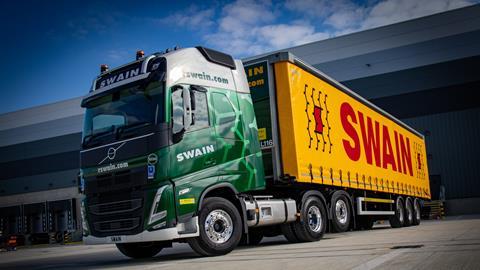Kent-based haulier R Swain fell into the red in 2023, thanks to a downturn in the construction sector and spiralling costs, but has returned to profitabilty this year through cutting costs and seeking new business, the company has revealed
Family-owned R Swain, which is based in Rochester, Kent, is the largest flatbed operator in the UK and specialises in heavy haulage, specialist lifting, container haulage, bulk solutions and general haulage.
It employs around 480 staff, operates a fleet of more than 400 vehicles and has depots in Rochester, London Gateway, Manchester, Swadlincote, Hatfield, Horley, Swinton and Tilbury.
Its latest annual results, to 30 December 2023, unveiled a fall in turnover to £68.6m (2022: £72.1m) and a pre-tax loss of - £2.2m, down from a pre-tax profit of £816,570 in the previous year.
In its strategic review to its annual results the company said 2023 presented “significant challenges” for the group, resulting in a “marked” reduction in profitability, with the decline in turnover largely due to a construction industry recession, coupled with an underperforming building materials sector.
R Swain also pointed to rising depreciation costs in the period, which increased by £356,846, up by 8.24%.
This was fuelled by the rising capital costs of trucks, resulting in higher depreciation charges associated with replacing vehicles.
Direct repairs also drained the company’s finances, with costs increasing by £182,366, a 6.02% rise.
The company attributed this to the need to keep older vehicles operational due to delays in the delivery of replacements, which led to higher maintenance and repair expenses.
Repairs and renewals costs leapt by £364,335 in the period, up 38.40%, due in part to a major planned schedule of repairs carried out in the year at the firm’s Rochester facility.
R Swain was also hit by a near doubling of charges on loans, which increased by £434,776, a 91.52% rise, whilst hire purchase interest charges grew by £384,685, representing a 96.42% increase.
The review noted: “The steep rise in Bank of England interest rates, along with higher borrowing requirements, led to this significant increase in financial expenses.”
At the same time there was a slump in subcontracting work, which fell by £2.9m compared to 2022.
The report added: “The lower availability of subcontractors had a notable impact on operational capacity and profitability.”
The company calculated the total impact of these additional costs as amounting to over £2.8m.
However, R Swain said it had taken a number of steps to successfully address these challenges, including managing its costs, particularly vehicle maintenance and repair costs, and reviewing its borrowing structure to mitigate the impact of rising interest rates.
It added that plans are also in place to expedite vehicle replacements, to cut ongoing repair costs and improve fuel and operational efficiency.
In addition, as the construction industry begins to stabilise, the group said it is seeking out new growth opportunities in the sector.
The review concluded: “The group, with the help of its dedicated workforce, through targeted cost control measures, strategic capital investments, and adjustments in market focus, has already seen a return to profitability in the current financial year.”
Commenting on the results, R Swain MD Matthew Deer said: “While last year presented significant challenges, particularly with rising costs and the downturn in the construction sector, we are proud of the decisive actions we have taken.
”Our team’s commitment to strategic cost management, improving operational efficiency, and focusing on growth opportunities has paid off. As mentioned, we have returned to profitability this year, and we are confident that with continued focus on cost controls and capital investments, R Swain will emerge stronger in the coming years.
”We remain optimistic about our future, and grateful for the hard work of our staff who have helped us overcome these hurdles.”

















